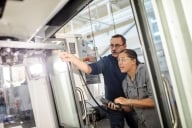You have /5 articles left.
Sign up for a free account or log in.
Amid much public discussion about whether college degrees still help graduates, the Pew Economic Mobility Project released a report Wednesday attempting to shed light on whether college is really worth it.
The report, unlike many other attempts to address the value of a college degree, does not look at the cost of attending a four-year institution, but instead considers only whether or not a degree still helps people find better jobs and earn more money.
The simple answer is yes. And, as the study’s main finding suggests, the impact of a college degree has not been affected by the recession nearly as much as some reports – particularly those about college grads living in their parents’ basements -- might suggest.
The report, “How Much Protection Does a College Degree Afford? The Impact of the Recession on Recent College Graduates,” drew from data from the 2003-2011 Current Population Survey by the U.S. Census, and used classifications from the Occupational Information Network (O*Net) to examine the employment trends of different populations. The study, which focused on recent graduates, compared the employment level and average wages of 21- to 24-year-olds with high school degrees, associate degrees, or bachelor’s degrees before, during, and after the recession, and found that while well-paid, college-level jobs have indeed been harder to come by since the recession, the effect has been significantly less severe for those with college degrees.
A few key facts:
- Prior to the recession, which the study defines as the period between December 2007 and June 2009, bachelor's graduates were already more likely to be employed than were associate degree holders, who were more likely to be employed than those without any postsecondary degree. After the recession, employment of college graduates dropped 7 percent, while associate degree holders experienced an 11 percent drop, and employment of high school graduates fell 16 percent.
- The decline in the number of people holding college-level jobs, which O*Net defines based on the most common level of education among people in a certain occupation over the course of the recession was only 3 percent for college graduates, half the size of the declines for both high school and associate degree holders.
- Average weekly wages fell 10 percent for high school graduates and 12 percent for associate degree graduates, but only 5 percent for four-year college graduates, over the course of the recession.
- The percent of people excluded from the workforce, meaning they were seeking work but couldn’t find it, rose 31 percent for college graduates, 37 percent for high school graduates, and 50 percent for associate degree graduates, though associate degree holders were still excluded at a lower rate than high school graduates.
- Enrollment in an educational program dropped for all three groups, contrary to the notion that many young people are waiting out the poor job market by seeking further academic training.
The findings echo the results of a report from the Georgetown University Center on Education and the Workforce, which found that four-year college graduates are unemployed and underemployed at lower rates and earn more than high school graduates.
Diana Elliott, research manager of Pew’s Economic Mobility Project, notes that according to the Pew study, associate degree holders also fare better than high school graduates.
The main takeaway, Elliott said, is that despite claims that the value of a college degree has been eroded, any amount of postsecondary education improves employment outcomes. “There are a number of press reports that have discussed children moving back in with their parents,” Elliott said. “Certainly this is not to discredit those individual stories, but what this does is it shows…that the trends over all do not find this to be the case for the nation as a whole.”








